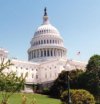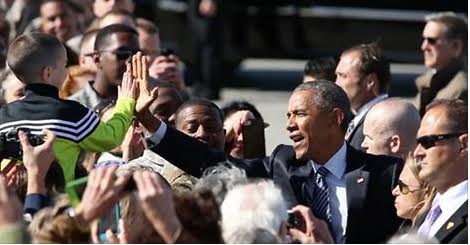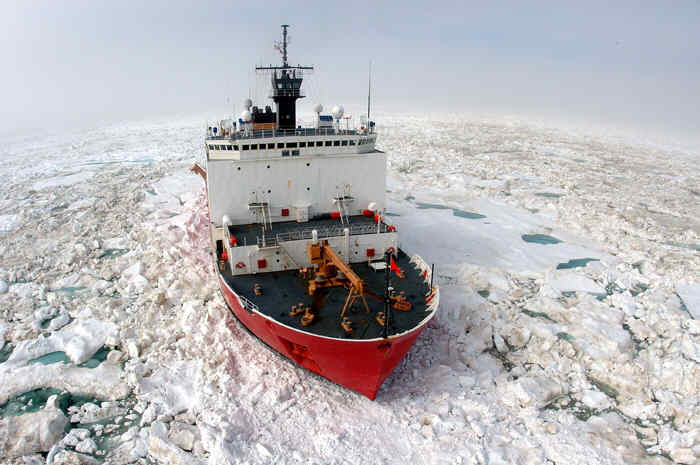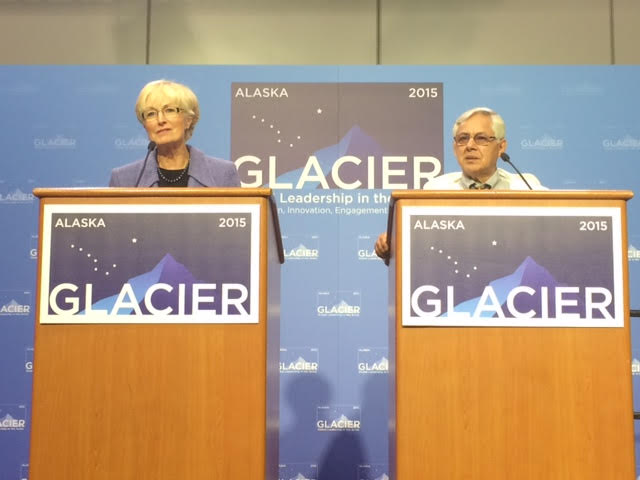|
|
|
|
|
|
|
|
 Today's Congressional Action: Today's Congressional Action:
The House and Senate are not in session.
|
 US is Playing Catch-Up With Russia in Scramble for the Arctic. US is Playing Catch-Up With Russia in Scramble for the Arctic. Aboard Coast Guard Cutter Alex Haley, in the Chukchi Sea - With warming seas creating new opportunities at the top of the world, nations are scrambling over the Arctic - its territorial waters, transit routes and especially its natural resources - in a rivalry some already call a new Cold War. When President Obama travels to Alaska on Monday, becoming the first president to venture above the Arctic Circle while in office, he hopes to focus attention on the effects of climate change on the Arctic. Some lawmakers in Congress, analysts, and even some government officials say the United States is lagging behind other nations, chief among them Russia, in preparing for the new environmental, economic and geopolitical realities facing the region. New York Times
 Obama to Call for More Icebreakers in Arctic as US Seeks Foothold. President Obama on Tuesday will propose speeding the acquisition and building of new Coast Guard icebreakers that can operate year-round in the nation's polar regions, part of an effort to close the gap between the United States and other nations, especially Russia, in a global competition to gain a foothold in the rapidly changing Arctic. On the second day of a three-day trip to Alaska to highlight the challenge of climate change and call for a worldwide effort to address its root causes, Mr. Obama's proposals will touch on one of its most profound effects. The retreat of Arctic sea ice has created opportunities for shipping, tourism, mineral exploration and fishing - and with it, a rush of marine traffic that is bringing new difficulties. New York Times Obama to Call for More Icebreakers in Arctic as US Seeks Foothold. President Obama on Tuesday will propose speeding the acquisition and building of new Coast Guard icebreakers that can operate year-round in the nation's polar regions, part of an effort to close the gap between the United States and other nations, especially Russia, in a global competition to gain a foothold in the rapidly changing Arctic. On the second day of a three-day trip to Alaska to highlight the challenge of climate change and call for a worldwide effort to address its root causes, Mr. Obama's proposals will touch on one of its most profound effects. The retreat of Arctic sea ice has created opportunities for shipping, tourism, mineral exploration and fishing - and with it, a rush of marine traffic that is bringing new difficulties. New York Times
[Opinion] Warmer Relations With Russia Will Backfire on the US. This weekend in Alaska, U.S. President Barack Obama will host a number of countries with interests in the Arctic. The event - called GLACIER (Conference on Global Leadership in the Arctic: Co-operation, Innovation, Engagement and Resilience) - brings together the eight members of the Arctic Council and other countries, such as China and Japan, that have interests in the Arctic region. This is a catch-all ASF view; only displays when an unsupported article type is put in an ASF drop zone. The meeting creates a very interesting dilemma for Canada. The Globe and Mail
 Obama Wants His Alaska Trip to be the 'Punctuation Mark' on his Climate Legacy. President Barack Obama sets off for a three-day tour of Alaska on Monday, aiming to shine a spotlight on how the United States is being affected by warming temperatures and rising oceans. With 16 months left in office, Obama is trying to build support for tough new rules on carbon emissions from power plants ahead of a hoped-for international climate deal later this year that could cement his legacy on the issue. The White House has said Obama will announce new policies to help communities adapt to climate change and deploy renewable energy. But the main purpose of his trip is to use the media attention on his tour - amplified by an aggressive social media campaign - to convince Americans to take action. Huffington Post Obama Wants His Alaska Trip to be the 'Punctuation Mark' on his Climate Legacy. President Barack Obama sets off for a three-day tour of Alaska on Monday, aiming to shine a spotlight on how the United States is being affected by warming temperatures and rising oceans. With 16 months left in office, Obama is trying to build support for tough new rules on carbon emissions from power plants ahead of a hoped-for international climate deal later this year that could cement his legacy on the issue. The White House has said Obama will announce new policies to help communities adapt to climate change and deploy renewable energy. But the main purpose of his trip is to use the media attention on his tour - amplified by an aggressive social media campaign - to convince Americans to take action. Huffington Post
Indigenous Concerns Get Spotlight at Arctic Conference. Indigenous residents from some of the smallest communities and most remote parts of Alaska had a message for international leaders who convened in Anchorage for a high-profile State Department-hosted Arctic conference: Climate change is an existential threat. "Today Alaska's Native peoples seek security, food security, economic security, cultural security, energy security. A changing world and climate impacts all of these," Reggie Joule, mayor of the Northwest Arctic Borough and an Inupiaq from Kotzebue, said in opening remarks at the conference known as GLACIER. Alaska Dispatch News
Kerry: Alaska Showcases 'Human Dimension' of Climate Change. Secretary of State John Kerry, in Alaska to host a high-level international conference on the rapidly changing Arctic, said Monday he took an important lesson from the tribal leader in a tiny Dena'ina village. When Lee Stephan, chief of the village government in Eklutna, opened the GLACIER conference with a reference to 10,000 years of indigenous history in Southcentral Alaska, that put the carbon-emitting Industrial Age -- which did not start until the late 1800s -- into perspective, Kerry said. Alaska Dispatch News
NASA to Study Arctic Climate Change Ecosystem Impacts with New ABoVE Campaign. NASA is gearing up to study the environmental and societal effects of climate change. The space agency has begun a multi-year field campaign to investigate changing climate in Alaska and northwestern Canada, focusing on thawing permafrost, wildfires and changes to wildlife habitats. Science World Report
Arctic Shipping Updates Offered at USARC's Final Day in Nome. Renewable energy and port development were the focus of the final session of the U.S. Arctic Research Commission's two day meeting in downtown Nome. Lorraine Cordova, project manager for the Alaska Deep Draft Arctic Port Study, offered port updates to the crowd and research suggestions to the commission. She commended Nome's Port Director Joy Baker and City Manager Josie Bahnke for their efforts in promoting Nome as the site of Alaska's deep-draft port. KTVA
|
|
Legislative Action
No Arctic legislation was formally considered Friday.
|
|
Future Events
11th Conference on Hunting and Gathering Societies (CHAGS XI), September 7-11 (Vienna, Austria). The study of hunter-gatherer societies has become, since the landmark conference "Man and Hunter" in 1966, a major topic of study within the social and human sciences community. While scholarly foci have changed during the last 50 years, the principle goal generated during the initial conference, to establish a unified field of hunter-gatherer studies, is as valid today as it was then. CHAGS XI hopes to explore how research results since 1966 and new research agendas can be applied for present and future study.
Eighth Polar Law Symposium Alaska 2015, September 23-26, 2015 (Fairbanks and Anchorage, Alaska , USA). The Eighth Polar Law Symposium is co-hosted by Alaska Pacific University (APU), the University of Alaska Fairbanks, the University of Alaska Anchorage (through its Justice Center and its Institute of Social and Economic Research), the University of Washington School of Law, and Vermont Law School, in cooperation with the Arctic Law Section of the Alaska Bar Association. The symposium will be held on both campuses of the University of Alaska. The 2015 theme is: The Science, Scholarship, and Practice of Polar Law: Strengthening Arctic Peoples and Places.
2015 Arctic Energy Summit, September 28-30, 2015 (Fairbanks, Alaska, USA). The Institute of the North's 2015 Arctic Energy Summit builds on our legacy efforts to address energy as a fundamental element of the sustainable development of the Arctic as a lasting frontier.Central to this concept is a focus on providing pathways for affordable energy development in the Arctic and for Arctic communities.
The Arctic Circle is the largest global gathering on the Arctic. It is attended by heads of state and governments, ministers, members of parliament, officials, experts, scientists, entrepreneurs, business leaders, indigenous representatives, environmentalists, students, activists, and others from the growing international community of partners and participants interested in the future of the Arctic. The Arctic Circle highlights issues and concerns, programs, policies and projects; it provides platforms for dynamic dialogue and constructive cooperation. While the plenary sessions are the responsibility of the Arctic Circle, the breakout sessions are organized by various participating partners in their own name and with full authority over the agenda and the choice of speakers.
2015 Arctic Science Conference, October 1-3, 2015 (Anchorage, Alaska, USA). The conference theme is "Healthy Estuaries: Sustainability and Resilience." Conference topics include traditional scientific disciplines, science education, arctic social sciences, biomedical research, and artistic interpretation of the evolving North. Abstract submissions are now being accepted. The deadline is August 1, 2015.
The Polar Oceans and Global Climate Change, November 3-6, 2015 (La Jolla, California USA). The American Polar Society will host this Symposium at Scripps Institution of Oceanography. A flyer with a partial list of presenters is available on the Society's website (americanpolar.org) and from the Society's Membership Chairman by email.
Forum for Arctic Modeling and Observational Synthesis Meeting, November 3-6, 2015 (Cape Cod, MA, USA). On November 3rd, the 2015 School for young scientists will consider "Regional Oceanography of the Arctic marginal seas" with lectures covering major features of atmospheric, sea ice and oceanographic regimes of the: Bering, Chukchi, Beaufort, East-Siberian, Laptev Sea, Kara, Barents and Nordic seas. On November 4-6, the meeting portion will summarize project accomplishments for the last 3 years of activities and will focus on the formulation of scientific questions and directions for FAMOS future research (2016-2019) to: (a) improve Arctic modeling, employing very high resolution models; (b) develop and test new arctic monitoring/observing systems and (c) improve predictions of Arctic environmental parameters with reduced uncertainties.
Due North: Next Generation Arctic Research & Leadership, November 5-8, 2015 (Calgary, Alberta, Canada). The Association of Canadian Universities for Northern Studies (ACUNS) will convene an interdisciplinary conference of early career scientists working on Arctic issues. Topics will include: Arctic Communities, Arctic Sustainable Development, Arctic Wildlife, Ecosystem and Biodiversity, Arctic Food Security, Arctic Landscapes, Climate Change and Adaptation, Disaster Risk Management, Policy, Politics and Leadership, Arctic Environment (Data and Techniques), Arctic Resources, and Future of Arctic.
Arctic Observing Open Science Meeting, November 17-19, 2015 (Seattle, Washington). The Arctic Observing Open Science Meeting will be 2.5 days and held at the Hyatt at Olive 8 in Seattle, Washington. The conference will bring together individuals and teams involved in the collection, processing, analysis, and use of observations in the Arctic - from academia, agencies, industry, and other organizations. The meeting will be convened as a combination of plenary talks, parallel science sessions, and a poster session. The agenda and registration information will be forthcoming.
In the Spirit of the Rovaniemi Process 2015, November 24-26, 2015 (Rovaniemi, Lapland, Finland).When the Arctic Environmental Protection Strategy, the so-called Rovaniemi Process, was adopted in 1991, it aimed at overcoming divisions and turning the zone of Cold War military tensions into a region of peace and co-operation. In this joint effort focusing on the protection of environment, and later, sustainable development, the Arctic states supported by indigenous organizations laid grounds for institutionalized collaboration and the emergence of Arctic regional identity. The second international conference will bring together decision-makers, scholars, artists, designers and students to address these questions and discuss the Arctic in global, regional and local perspectives.
|
|

  
4350 N. Fairfax Drive, Suite 510
Arlington, VA 22203, USA
External links in this publication, and on the USARC's World Wide Web site ( www.arctic.gov) do not constitute endorsement by the US Arctic Research Commission of external Web sites or the information, products or services contained therein. For other than authorized activities, the USARC does not exercise any editorial control over the information you may find at these locations. These links are provided consistent with the stated purpose of this newsletter and the USARC Web site.
|
|
|
|
|
|
|
|
|